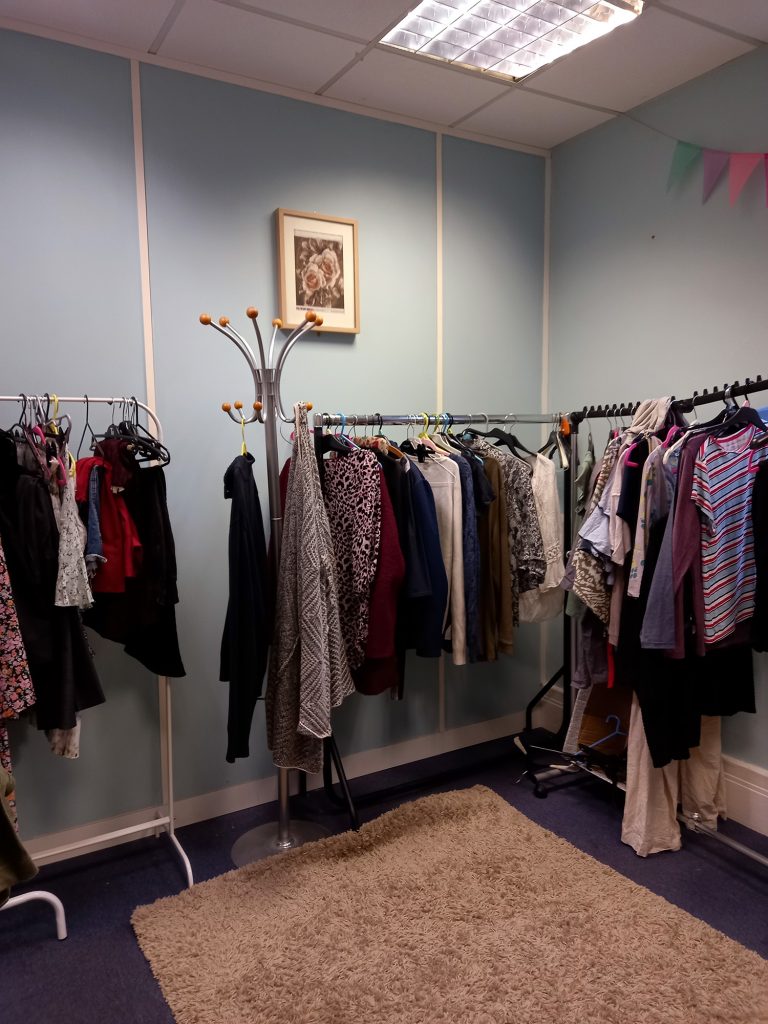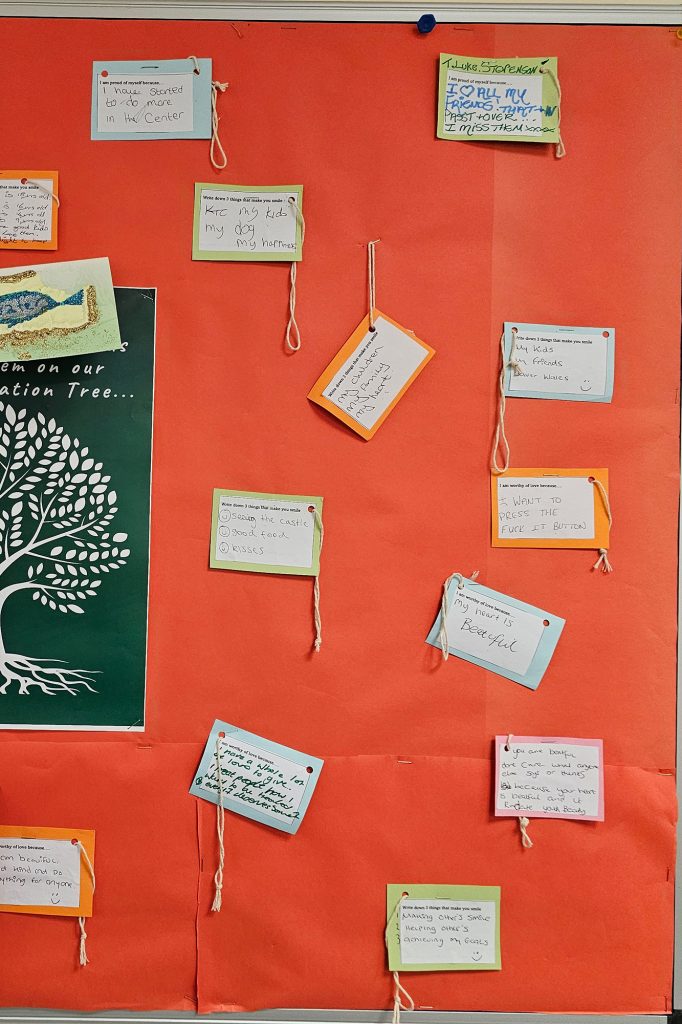The women’s centre is a lifeline for those with nowhere to go for the holiday
CHRISTMAS is a difficult time for those without a family or stable home life. The women who go to Safer Wales’ women’s centre often feel forgotten.
Jane Coppock manages the Street Life project at Safer Wales, and has been working at charities for about 40 years.
“I personally struggle with Christmas – it’s such a happy time for most people but there’s a lot of loss with whatever they’ve been through,” she told me.
Safer Wales, a charity based in the city centre, has spent 20 years supporting women who have been the victims of domestic violence, sexual abuse, and exploitation.
Its centre is a space where these women can come to get food parcels, use the washroom, or just relax in a warm place with others in a similar situation.
Street Life works with women who are sexually exploited. Ms Coppock told me: “Previously, that would have been sex working, but we use sexual exploitation because that’s what they are – they’re being sexually exploited.”
It’s just one moment of violence, but it’s years and years of aftermath.
Melissa, not her real name, often comes to the centre. She told me: “I’m a writer, I make a little bit of money online writing. But, mostly I make my money sex working.
“I know girls on probation, they see me in the street and they ask, ‘why do you come here voluntarily?’
“Really? It’s warm food. It’s positive. It gives me a bit of routine structure. If I come in every day, I tend to be a lot more stable than if I’m missing sessions.”
After studying at university for three years, Melissa worked as a researcher for a charity but since experiencing violence during lockdown she has struggled to stay employed.
She told me: “I just kind of crumbled. I lost my job from just being too traumatised to work. I lost my money, I lost my network, I lost my routine – and I’m just trying to claw it back.
“It seems very unfair that I lost all of those things, you know? It’s just one moment of violence, but it’s years and years of aftermath.”
Melissa has an account on Fiverr where she is paid to write blog posts for clients, earning around £100 for each one.
She said to me: “They tell me stories and I write them up. A little bit like what you’re doing here.
“It’s not stable enough to be a job, but at night, it’s a win. I always feel proud when I make legitimate money.”
A safe space to go

Many of the rooms have been decorated by the women who use the centre, with art that they made hanging from the walls.
Melissa said: “One of the things I like about this place is you can be quite candid. Really know you can talk really openly about violence.
“Whereas if I was like, in an office place or something, I would have to be really mindful about what I said.
“And that kind of feels like you’re living in secret – you’ve got this public life, and then you’ve got this real life back at home.
“I’ve got no problem with anybody knowing my business. But in this world it just doesn’t work like that, so we have to have safe spaces where we can be ourselves.”
Ms Coppock said: “That’s why I think the centre is such a fantastic resource. The women see this as their safe space.
“And they aren’t judged, that’s a big thing, they say we don’t judge them. They feel that everyone is against them and it becomes a kind of self-fulfilling prophecy.”
A room in the centre, with one of the women’s art hanging on the wall. Credit: Catherine Linnie-Godden
Christmas at the centre
Walking into the centre, the first thing that catches your eye is the notice board displaying the women’s Christmas wishes. One woman wishes for world peace, another to win the lottery, and another to have their children again.
The women’s Christmas wishes at the Safer Wales centre. Credit: Catherine Linnie-Godden
Catherine Linnie-Godden is the activities coordinator at Safer Wales, and she’s worked at the charity for three years.
She said: “It’s a really difficult time for them. Their moods are all up and down – they’ve just been reminded of things they haven’t got.”
Another woman at the centre, Alice, not her real name, said: “It’s just a lonely time at Christmas, obviously. I don’t know where I’m going to go – that’s the hardest thing, everyone’s got family, I have nobody.
“The centre saved my life to be honest with you. I was lost before I came here. I used to get into trouble all the time. These people saved me in my eyes.”
Like most who come to the centre, Alice has made many close friends there. She said: “I wouldn’t be able to cope without my friends. That’s who got me through most of it to be honest with you.
“It’s hard to trust people when you’ve been through what I’ve been through, but I’m a survivor, and that’s all that matters. When you’re on your own – your friends are all you have, so you’ve got to hold on to them. Very tight.”
Alice asked what I was doing for Christmas. I told her I was going home to see my family and she replied: “Oh you’re so lucky, so lucky. I envy you – I hope you look after them.”
Melissa told me: “I’ve been building some bridges with some of my family. So I’m gonna have my first Christmas with my mother since I was a kid – and I’ll tell you that I’m going to be spoiled that day.
“So I’ve got to work harder – I’ve had to kind of take maybe some more dangerous jobs and maybe make some decisions that I wouldn’t have otherwise to have the money for Christmas.”
I’m gonna have my first Christmas with my mother since I was a kid – and I’ll tell you that I’m going to be spoiled that day.
What the centre means to the women
The women at the centre take part in activities as a group, like cross stitching. Alice told me: “I do it every week, it keeps me level headed. Keeps me on top form, around the most beautiful people.”
The centre encourages them to take courses in the things that they enjoy. One woman who loves to cook was put on an online course to complete a level two food and hygiene certificate and passed.
“She’s so over the moon with herself for doing that and it’s really great,” Ms Linnie-Godden told me.
Rebecca, not her real name, is a service user who also volunteers with the charity. She said: “I like to give help to women, and it makes me feel good that I’m giving help back. They feel like if they have problems they can come to me.
“Obviously there’s also the staff, but it makes me feel good that they can come to me and speak to me as a sort of mentor but as a friend as well.”
Ms Coppock told me: “Another thing that women value about here is that we don’t ask them to tell their story again. It happens so many times that they’re getting retraumatised by having to answer – why are you here? How have you got to this point?”
Street Life runs outreach services three nights a week, supporting women on the street with advice and supplies, and encouraging them to come to the women’s centre.
They also offer daytime one-to-one services, giving advice on issues such as housing. A lot of the women they help live in temporary accommodation such as hostels.
Ms Linnie-Godden said: “Sometimes they just want to come in and talk about what was on TV.”
“Love Island … and I’m a Celeb – it’s really nice,” Ms Coppock said.
“They really do feel invisible sometimes,” Ms Linnie-Godden added.
Ms Coppock told me: “It’s tough, there’s not always something tangible at the end of it. We haven’t made them well, we haven’t made everything perfect for them.
“Sometimes I say this to the team. They’re like, she hasn’t managed to get to this or she’s not engaging with that – but what’s a result is the fact that they’ve answered a text message to you or they’ve answered the door when you’ve been round.
“That’s a result for them because they then know that there’s someone there.”

The positive affirmation tree at the centre. Credit: Eoin McCaul
Hopes for the future
“What I’d like the centre to work towards now, is getting more funding to stay open later and on weekends. It’s needed – we can’t just be here during the daytime hours,” Ms Linnie-Godden said.
Ms Coppock added: “The other thing we’d really like is our own hostel. We want a little four to six-bed place where we can be, and have a multi-agency team based there. So have drugs workers, mental health workers …
“That’s my wish.”



